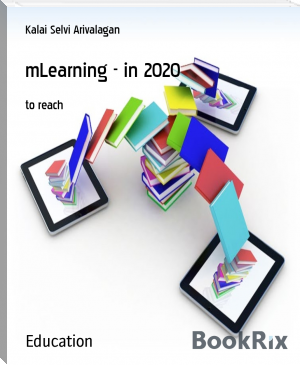INNOVATIONS IN SCIENCE, TECHNOLOGY AND MATHEMATICS EDUCATION IN NIGERIA - Ebele C. Okigbo, Nneka R. Nnorom, Ernest O. Onwukwe (best novel books to read TXT) 📗

- Author: Ebele C. Okigbo, Nneka R. Nnorom, Ernest O. Onwukwe
Book online «INNOVATIONS IN SCIENCE, TECHNOLOGY AND MATHEMATICS EDUCATION IN NIGERIA - Ebele C. Okigbo, Nneka R. Nnorom, Ernest O. Onwukwe (best novel books to read TXT) 📗». Author Ebele C. Okigbo, Nneka R. Nnorom, Ernest O. Onwukwe
Planning
What is the problem? What am I trying to do here? What do I know about the problem so far? What information is given to me? How can this help me?, What is my strategy?
Monitoring
Am I using my strategy? Am I on the right track? Do I need a different strategy?
Evaluating
What worked? What didn’t work?, What would I do differently next time? (Schraw.1998). Using a self-questioning strategy helps students focus on the critical information in the text Several variations of self-questioning interventions have demonstrated increased reading comprehension for narrative and expository texts. For example, Pate and Millerm (2011) found that students who use a regulatory self - questioning scored higher than students who did not use self questioning in English language Meta-analysis conducted on RSQ was found that the RSQ approach has a positive effect on the academic achievement of learners toward science courses compared to traditional teaching methods (Laurice, Sheila, Jennifer & Christina, 2015). Regulatory self -questioning during problem solving may hold promise for enhancing students achievement in Agricultural Science, but no study known to these researchers in the context of secondary school chemistry concepts "gas laws" There is need therefore to investigate the effect of regulatory self -questioning on students’ academic achievement.
Apart from teaching methods and strategies used by teachers in teaching and learning; Amir, Satar and Kourosh (2011) found gender issue as an important factor that could be a hindrance to academic progress of the learners in sciences. There have been contrasting opinions on gender related issues on achievement in chemistry and other science subjects. For instance, Inomesa, Achufusi and Mgbemena (2013), in their study on Effect of self - regulated learning and meta cognitive learning cycle on the achievement of physics students found out that there is no significant differences in the cognitive, affective and psychomotor skills achievement of students with respect to gender. Studies carried out by Anyichie (2012) and Catherine (2013) on effects of self-instructional learning strategy on secondary school students' academic achievement in solving mathematical word problems in Nigeria revealed that male students performed better than female students in mathematics and science subjects respectively. In contrary, Orefor (2016) in the study on effects of meta cognitive instructional strategy on secondary school students' academic achievement and retention revealed that female students performed better than male students in chemistry. In view of this, there is no consistent result on gender issues on students achievement in chemistry. This shows that more works on gender differences in achievement in chemistry is still needed. Against this background therefore, it is worthwhile to see how regulatory self questioning would bridge the gap on chemistry achievement respect to gender.
Purpose of the Study
The main purpose of this study was to determine the effect of regulatory self–questioning on achievement scores of secondary school chemistry students in Gas laws problems. Specifically, the study sought to determine;
The mean academic achievement scores in Achievement Test on Gas Laws (ATOGL) of chemistry students exposed to RSQ strategy and those taught with lecture method.
The deference between mean academic achievement scores of male and female students in chemistry when exposed to RSQ strategy
The interaction effect of instructional strategy and gender on students’ academic achievement in chemistry.
Research Questions
What is the deference between the mean academic achievement scores in Achievement of chemistry students exposed to RSQ strategy and those exposed to lecture method?
What is the difference between the means academic achievement scores of male and female students taught chemistry using RSQ strategy?
Hypotheses
There is no significant difference in the mean achievement scores of chemistry students exposed to RSQ strategy and those exposed to lecture
There is no significant difference in the mean achievement scores of male and female students taught chemistry using RSQ strategy as measured by ATOGL.
There is no significant interaction effect between instructional strategy ( regulatory self questioning) and gender on students' achievement in chemistry
Methods
The design of the study was quasi-experimental, specifically a pretest post test non-equivalent control group design. In this type of design, the researcher cannot randomly sample the research subjects. The study was conducted in Onitsha North Local Government Area of Anambra State. The rationale for the choice of the area is based on the fact that student in the area achieve poorly in chemistry. Hence, the researcher investigated effect of regulatory self questioning on students’ academic achievements in the area of Gas laws.
The population of the study comprises of 6,449 (4317 males and 2132 females) Senior Secondary Class one (SS1) chemistry students in Onitsha North Local Government Area of Anambra State. This is because the topic chosen for the study is taught in first term of SS1 according to chemistry core curriculum. The sample consists of 95 (55 males and 40 males) chemistry students drawn from two co-educational schools in Onitsha North Local Government Area using a purposive sampling technique. Simple random sampling (balloting with replacement) was used to select. One intact class in one of sampled schools was taught using regulatory self questioning strategy (experimental group), while the other school in another school was taught with lecture method (control group).
The instrument used for data collection was Achievement Test on Gas Laws (ATOGL). Specifically, the questions in the instrument were drawn from 2007-2013 SSCE Examination past question papers. It was made up of 25 multiple choice questions Each question has four (4) options A,B,C,D, scored 2 marks each with total of 50 marks. This test was designed to measure students’ academic achievement in solving Gas Laws problems. A reliability index of 0.83 was established using Kudder -Richardson formular 20 (KK20) reliability coefficient.
On the first day, test was administered to both the experimental and control groups as pre-test. This was followed by the treatment which lasted for six weeks. Each lesson period lasted for eighty (80) minutes (double period). At the end of the treatment, post-test was administered to both group using the same instrument but with the questions reshuffled. The test was marked and scores were recorded. Data collected were analysed using mean, standard deviation and Analysis of Covariance (ANCOVA); Research questions were answered using Mean and Standard deviation while hypotheses were tested at 0. 05 level of significance using Analysis of Covariance (ANCOVA).
Results
Research Questions 1: What are the mean academic achievement scores on Achievement Test on Gas Laws (ATOGL) of chemistry students exposed to RSQ strategy and those exposed to lecture method?
Table 1: Means and Standard Deviations of students Achievement Scores in experimental and control groups.
Data presented in Table 1 shows that students exposed RSQ had gain in mean academic achievement score of 30.39 while the gain in mean academic achievement score of control group was 15.65. It then indicates that students exposed to regulatory self questioning strategy performed better in chemistry achievement test than those exposed to lecture method.
Research question 2: What is the difference between means academic achievement scores of male and female students taught chemistry using RSQ strategy?
Table 2: Means and Standard Deviations of male and female students Achievement
Scores in experimental group
Gender
Pretest Score
Posttest Score mean
N
Mean
SD
Mean
SD gain
Male
35
13..45
11.96
57.41
6.06 43.96
Female
12
15.93
9.51
58.50
6.64 42.57
Data in Table 2 revealed gain in mean achievement scores of 43.96 for male and 42.57 for female. Male students therefore had higher mean gain scores than their female counterpart in chemistry.
H01: There is no significant difference in the mean achievement scores of chemistry students exposed to Regulatory Strategy questioning strategy.
Table 3: Summary of Analysis of Covariance (ANCOVA) of Students' Achievement scores by Teaching Methods, Gender and Interaction
Tests of Between-Subjects Effects
Dependent Variable: posttest
Source
Type III Sum of Squares
Df
Mean Square
F
Sig.
Corrected Model
5764.549a
4
1441.137
27.612
.000
Intercept
77069.763
1
77069.763
1476.658
.000
Pretest
1.896
1
1.896
.036
.849
Method
5137.053
1
5137.053
98.426
.000
Gender
103.223
1
103.223
.2.296
.133
method * gender
34.241
1
.34.241
.656
.420
Error
4853.859
90
52.192
Total
260846.000
95
Corrected Total
10618.408
94
Data presented in Table 3 shows there is a significant mean effect of mode instructional on students' academic achievement in chemistry. The table shows that the F-value (98.426) with an associated level of significance (0.000) was obtained. The sig (0.000) under method is less than level of significance (0.05) set by the researcher.
Hence, null hypothesis is rejected, which means that therefore, there was a significant difference between the mean academic achievement scores of students taught chemistry using regulatory self questioning strategy and those taught using lecture method.
H02: There is no significant difference in the mean achievement scores of male and female students taught chemistry with RSQ strategy as measured by ATOGL.
Data in table 3 above revealed no significant effect of gender on the mean academic achievement scores of students in chemistry. The table reveals that the F-value of 2.296 with an associated level of significance (.133) under gender is greater than significant level (0.05). Hence, the null hypothesis was accepted, it then means there is no significant difference in the mean academic achievement scores of male and female students taught chemistry with regulatory self questioning.
H03: There is no significant interaction effect between instructional strategy and gender on students' achievement in chemistry.
Table 3 reveals that F- value of 0.656 was obtained with level significance (0.420) under method and gender. The sig (0.420) obtained is greater than level of significance (0.05) set by the researcher. Hence, the null hypothesis was not rejected. Therefore, there is no significant interaction effect of instructional treatment and gender on students’ academic achievement as determined by their mean scores in chemistry.
Discussion
The findings of this study showed that students exposed to regulatory self questioning achieved significantly better than the students exposed to lecture method. The significant difference could be as result of self monitoring and self evaluation activities provided by the regulatory self questioning which helped the students to understand the gas laws concepts and had ability to solve problems better than the students in the control group. The finding of this study is in line with the views of Pate& Miller (2011) who indicated that students achieved significantly better when taught with regulatory self questioning than when taught with the conventional method.. The finding is also in line with Laurice, Shella, Jennifer and Christina (2015) who reported in their study that, the achievement of students in English greatly improved with self questioning strategies.
The analysis of results of gender and achievement as shown above revealed that gender did not influence students’ achievement in chemistry significantly. The finding revealed that there is no significant difference in male and female students’ achievements scores in chemistry. Although, the mean gain achievement for male students is slightly higher than their female counterparts. The findings is in agreement with the findings of Inomesa, Achufusi and Mgbemena (2013) that found equal mean gain for both male and female groups. The finding also, agrees with Jayapraba (2013) and Udousoro (2011) thatfound no significant difference in male and female students’ achievements scores in chemistry.
However, some scholars reported contradictory findings; (Anyichie (2011); Catherine (2013; Amir, Satar & Kourosh, 2011) found that male students outperformed the female students. While Uwalake (2013) study revealed that female students performed better than male in chemistry. The difference in the findings could be as a result of location influence and handling of extraneous threats to the experiment. From the findings of this study and other previous studies which are in support of the present study, one would say that gender has no influence on students’ academic





Comments (0)